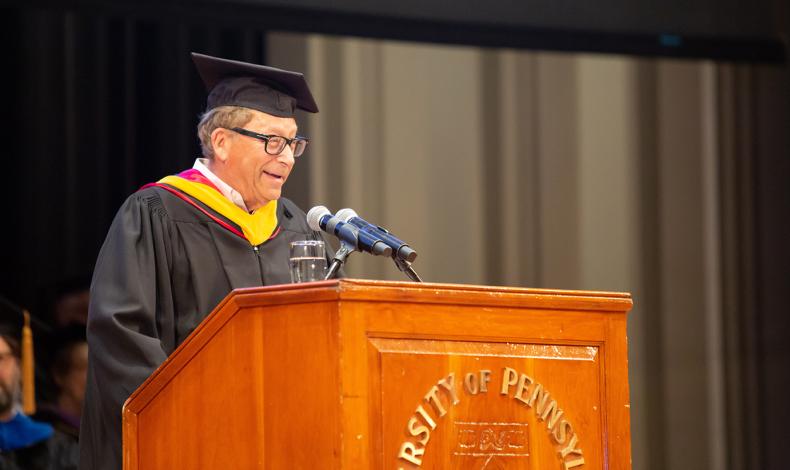Celebrating the Class of 2019 with Stuart Weitzman

The University of Pennsylvania Stuart Weitzman School of Design’s 2019 Commencement Ceremony
Watch the Video
View the Flickr Album (Coming Soon)
View the List of Graduates and Awards Recipients
If graduation is inherently an occasion for celebration—an academic victory lap after a marathon of studio reviews, exams, and thesis deadlines—the University of Pennsylvania Stuart Weitzman School of Design’s 2019 Commencement Ceremony was the ultimate graduation. Joining the students, guests, and faculty gathered at Irvine Auditorium on May 18 was Stuart Weitzman, the award-winning designer for whom Weitzman School was named in late February, and the evening’s featured speaker.
A 1963 graduate of the Wharton School, Weitzman had been a generous donor to the University for over two decades and continuously interacted with the Penn community when he came to realize that the opportunity to help elevate the Weitzman School aligned with his life’s work and intention to support the University more profoundly. Through a series of transformational gifts for student fellowships and academic programs, he has helped ensure that the School will continue to attract the world’s most promising aspiring architects, landscape architects, planners, preservationists, and fine artists.
“The impact of Stuart’s generosity will be felt forever,” Fritz Steiner, the Weitzman School’s Dean and Paley Professor, told the audience in introducing Weitzman.
Weitzman, who is chairman emeritus at Stuart Weitzman, LLC, took the audience behind the scenes of the luxury footwear company he founded by recounting pivotal moments in its rise—moments like the evening in 1983 when, after winning an American Music Award, Aretha Franklin held up a pair of custom-made Stuart Weitzman shoes to thank the designer for making her look, and feel, good.
Drawing on his decades-long experience navigating the “heavily overcrowded industry” of luxury footwear, Weitzman offered five truisms—or “Stuisms”—to guide graduates in their professional lives.
“‘Risk’ is not a four-letter word,” he insisted, “risk is actually your friend.” He cited the examples of American Pop artist Andy Warhol, Catalan architect Antoni Gaudí, and American architect Frank Gehry, “who, with one building, changed the destiny of a city of 500,000 people.”
“Just imagine if Michelangelo had been afraid of risks,” Weitzman went on. “He would have painted the Sistine Chapel floor!”
Weitzman urged graduates to follow their passion, cultivate their imagination, stay focused on function as the essence of design, and be ready to break with convention for an untapped opportunity.
“My wish for all of you, graduates, is that you find what makes your heart sing,” he said, finally. “That will make your work seem like your hobby.”
In the course of the two-hour ceremony, some 300 graduates walked across the stage to collect their degree. They’d come to Penn from 37 U.S. states and 39 countries—as far away as Liberia, Russia, and New Zealand—but they were leaving with a shared homeland, their alma mater. Among them, 70 earned a Master of Architecture; five a Master of Science in Architecture; 51 a Master of Science in Design with a concentration in Advanced Architectural Design; 60 a Master of City Planning; 21 a Master of Urban Spatial Analytics; 11 a Master of Fine Arts; 19 a Master of Historic Preservation; 43 a Master of Landscape Architecture. And three students earned a Doctor of Philosophy: two in Architecture, and one in Planning.

